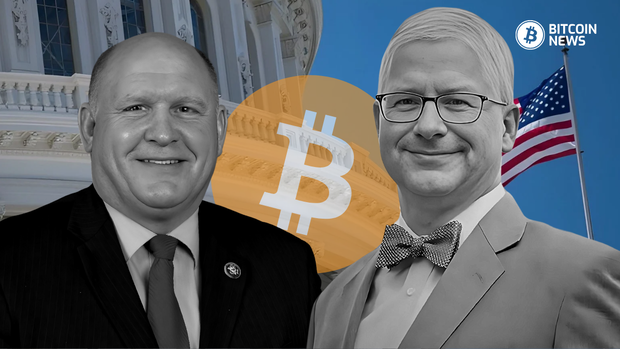In a landmark move for the digital asset industry, the U.S. House of Representatives has passed the Financial Innovation and Technology for the 21st Century Act, commonly known as the FIT21 bill.
This sweeping piece of legislation aims to provide much-needed regulatory clarity for digital assets in the United States. The bill passed with a significant bipartisan vote of 279-136, marking the most substantial legislative accomplishment for Bitcoin in Congress to date.
The FIT21 bill is designed to address the long-standing regulatory ambiguity surrounding digital assets. Authored by House Agriculture Committee Chair Glenn Thompson (R, Pa.), the bill was first introduced to the House floor in July 2023.
It aims to define and clarify the roles of the Securities and Exchange Commission (SEC) and the Commodity Futures Trading Commission (CFTC) in regulating digital assets.
Chairman Glenn Thompson, said:
“Clarity in digital assets is crucial. Today’s bipartisan passage of the Financial Innovation and Technology for the 21st Century Act is a significant milestone. It underscores the House Committees on Agriculture and Financial Services’ efforts to establish a much-needed regulatory framework.”
Chairman Thompson added that the new framework aims to safeguard consumers and investors while promoting American leadership in the digital asset sector.
One of the primary goals of the bill is to establish a “digital commodity” term for specific digital assets, which would provide a clear distinction between which tokens are securities and which are commodities.
The bill’s provisions include improved consumer protections, clearer regulatory guidelines, and a framework for digital asset exchanges.
Digital asset developers will be required to provide accurate disclosures about their projects, and customer-serving institutions like exchanges, brokers, and dealers will need to segregate customer funds from their own and reduce conflicts of interest.
This clarity is expected to foster innovation while ensuring robust consumer protections.
The passage of the FIT21 bill was marked by strong bipartisan support, with 71 Democrats joining 208 Republicans in favor of the legislation.
Rep. Josh Gottheimer (D-N.J.), one of the Democrats who supported the bill, called it “well-reasoned, thoughtful, bipartisan legislation” and argued that “it’s fit to become law if we work together. We need rules of the road.”
Chairman Patrick McHenry highlighted the significance of the FIT21 bill for maintaining U.S. leadership in technological innovation. He noted that the passage of FIT21 provides regulatory clarity and robust consumer protections for the digital asset ecosystem.
He urged the Senate and the Administration to act to ensure safe engagement with digital assets for Americans.
Rep. French Hill celebrated the House’s bipartisan approval of FIT21, describing it as a historic day for American consumers, investors, and innovators.
He emphasized that the bill establishes a regulatory framework for digital assets that protects consumers and investors while promoting U.S. leadership in blockchain innovation.
Hill highlighted the need for such a framework, citing the collapse of FTX as evidence. He praised the committee members’ efforts, highlighting that he remains committed to advancing the bill until it becomes law.
Despite the broad support, the bill has faced opposition from several quarters, including the Biden administration and SEC Chair Gary Gensler.
The administration issued a policy statement opposing the passage of the bill but stopped short of threatening a veto. President Biden has expressed willingness to collaborate with lawmakers to create clear digital asset legislation.
Gensler criticized the bill for creating “new regulatory gaps” and undermining decades of precedent regarding the oversight of investment contracts. He argued that the bill could put investors and capital markets at “immeasurable risk.”
Rep. Maxine Waters (D-Calif.), the ranking Democrat on the House Financial Services Committee, also voiced her opposition, arguing that the bill seeks to let digital asset businesses avoid responsibility.
“They have already made billions of dollars unlawfully issuing or facilitating the buying and selling of crypto securities,” Waters said, while adding:
“Republicans are now proposing to reward these illegal activities by making these activities legal […] [FIT21 is a] wish list of big crypto and is undeserving of any of our support, worst, most harmful proposal I have seen in a long time.”
Massachusetts Democrat, Stephen Lynch, called it a “radical rewrite of the securities laws of this country.” He added, “This will cause havoc in our financial markets, eventually.”
Wiley Nickel, North Carolina Democrat, said the US was “relying on a 90-year-old securities law, written before the internet was even invented.”
The FIT21 bill now heads to the Senate, where its future is uncertain. The Senate has not yet introduced a companion bill, and the legislative process there is expected to be more complex.
The bill could face significant delays and potential revisions as it makes its way through various Senate committees.
Senator Elizabeth Warren, one of the country’s most prominent Bitcoin critics, is expected to be a significant obstacle. The Senate will need to consider the bill in committee, potentially subjecting it to rounds of reviews, hearings, and markups before it can be brought to a vote.
If the Senate passes a different version of the bill, members of both chambers will need to reconcile the differences.
Regardless of the rough road ahead, the digital asset industry has largely welcomed the passage of the FIT21 bill.
Coinbase CEO Brian Armstrong described the bill’s passage as “a total victory” and a significant step toward establishing clear Bitcoin and digital asset rules. He highlighted the bipartisan support as a sign of growing recognition of the need for regulatory clarity.
It’s worth mentioning that last week, numerous digital asset companies, such as Coinbase, Andreessen Horowitz, and Kraken, endorsed an industry letter coordinated by the Crypto Council for Innovation, backing the FIT21 initiative.
The letter said, “The US lags behind other major jurisdictions in developing a regulatory framework for digital assets […] It is crucial for the US to maintain its leadership in financial innovation.”
If passed, the FIT21 bill could significantly impact the Bitcoin market by providing a stable regulatory environment. This stability could attract more investors and foster innovation within the industry.
Holland & Knight senior policy advisor Scott Mason noted that FIT21 “is definitely an opportunity to give the crypto/blockchain industry confidence that the US is a friendly market, the industry is here to stay, and the US needs to lead.”










